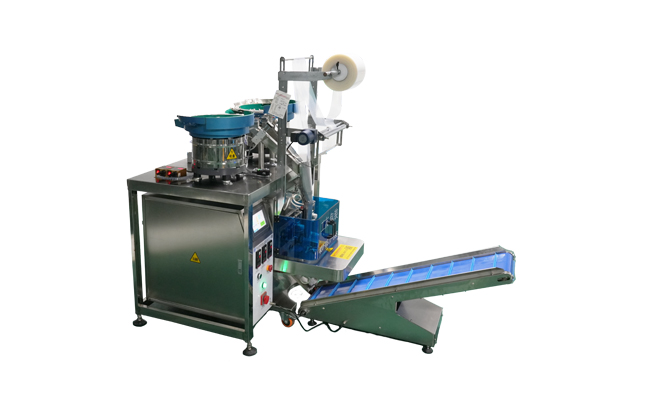
Date | 2023-05-12 01:29:52
Introduction:
In today's fast-paced manufacturing industry, efficiency and accuracy are crucial factors for success. One key aspect that significantly contributes to streamlined operations is the packaging process. To meet the demands of the hardware industry, the hardware packing machine has emerged as a revolutionary solution. In this article, we will explore the technical aspects of the hardware packing machine and its benefits in improving packaging efficiency.
Machine Overview:
The hardware packing machine is an advanced automated system designed specifically for packaging hardware products. It combines cutting-edge technology with precise engineering to ensure optimal performance. This machine integrates various components, including a conveyor belt, sensors, robotic arms, and a control panel, to facilitate seamless packaging operations.
Automated Packaging Process:
The hardware packing machine operates through a series of automated steps that ensure accurate and efficient packaging. The process begins with the hardware products being fed onto the conveyor belt. The sensors detect the products and relay the information to the control panel. The control panel then communicates with the robotic arms to perform the necessary actions, such as picking up the products, placing them in the packaging material, and sealing the packages. This automated process eliminates the need for manual intervention, reducing errors and increasing productivity.
Customization and Flexibility:
One of the key advantages of the hardware packing machine is its ability to accommodate various hardware products of different shapes and sizes. The machine can be easily programmed to adjust its settings according to the specific requirements of each product. This flexibility allows manufacturers to streamline their packaging processes for different hardware items, saving both time and resources.
Efficiency and Cost Savings:
By utilizing the hardware packing machine, manufacturers can experience significant improvements in efficiency. The automated process ensures consistent packaging quality and reduces the occurrence of errors. Additionally, the machine operates at a high speed, enabling faster packaging cycles and increased production output. As a result, manufacturers can meet deadlines more effectively, leading to customer satisfaction and potential business growth. Moreover, the reduction in labor requirements due to automation can result in substantial cost savings for the company.
Quality Control and Safety:
The hardware packing machine incorporates advanced technology to ensure stringent quality control during the packaging process. The sensors detect any irregularities, such as missing or damaged products, and trigger an alert to the control panel. This enables timely intervention and prevents defective products from reaching the market. Furthermore, the machine adheres to strict safety standards, reducing the risk of accidents and injuries associated with manual packaging operations.
Conclusion:
The hardware packing machine revolutionizes the packaging process in the hardware industry by offering automated solutions that enhance efficiency, flexibility, and quality control. Its ability to handle various hardware products and adapt to specific requirements provides manufacturers with a competitive edge. With increased productivity and cost savings, businesses can optimize their operations and focus on meeting customer demands effectively. Embracing this advanced technology can lead to a brighter future for hardware manufacturers, elevating their packaging processes to new heights of excellence.Advancements in Technology: The Future of Hardware Packing
Introduction:
As technology continues to evolve at a rapid pace, the hardware packing industry is poised for a transformative revolution. In this article, we will explore the latest advancements in hardware packing machines and their potential to shape the future of packaging. From improved automation to enhanced sustainability, these developments promise to revolutionize the way hardware products are packaged and delivered.
Smart Packaging Systems:
The future of hardware packing lies in the integration of smart technologies. These intelligent packaging systems utilize sensors and connectivity to enhance the efficiency and accuracy of the packaging process. Sensors embedded within the packaging machines can gather real-time data on product weight, dimensions, and quality. This data can then be analyzed to optimize packaging techniques, reduce material waste, and ensure precise product placement.
Machine Learning and Artificial Intelligence:
Machine learning and artificial intelligence (AI) have the potential to revolutionize hardware packing machines. By leveraging vast amounts of data, AI algorithms can continuously improve packaging efficiency and adapt to changing product requirements. These technologies can analyze patterns, predict optimal packaging configurations, and even identify potential issues or errors before they occur. This not only improves productivity but also enhances the overall quality of packaged hardware products.
Sustainable Packaging Solutions:
With increasing awareness of environmental sustainability, the hardware packing industry is also focusing on developing eco-friendly packaging solutions. Future hardware packing machines will incorporate sustainable materials and processes, such as biodegradable packaging materials and energy-efficient components. Additionally, these machines will be designed to minimize material waste, optimize packaging configurations for maximum space utilization, and reduce the carbon footprint associated with packaging operations.
Robotics and Automation:
The integration of robotics in hardware packing machines is another significant development on the horizon. Robotic arms equipped with advanced gripping mechanisms can handle a wide variety of hardware products with precision and speed. These robots can work in collaboration with human operators or independently, further streamlining the packaging process. With increased automation, manufacturers can expect higher production rates, improved accuracy, and reduced labor costs.
Enhanced Safety Features:
Safety is a paramount concern in the hardware packing industry. Future packing machines will incorporate advanced safety features, such as improved sensors and intelligent algorithms that can detect potential hazards and prevent accidents. These features will ensure the well-being of operators and minimize the risk of injuries associated with packaging operations.
Conclusion:
The hardware packing industry is on the brink of a technological revolution. With advancements in smart packaging systems, machine learning, sustainable solutions, robotics, and enhanced safety features, the future of hardware packing looks promising. These developments will not only optimize efficiency and productivity but also contribute to a more sustainable and environmentally conscious packaging process. Embracing these technologies will enable hardware manufacturers to stay ahead of the competition, meet evolving consumer demands, and shape a brighter future for the industry as a whole.
